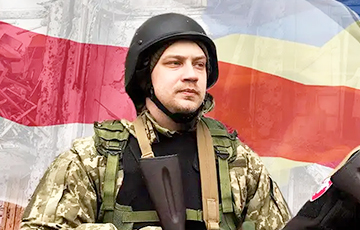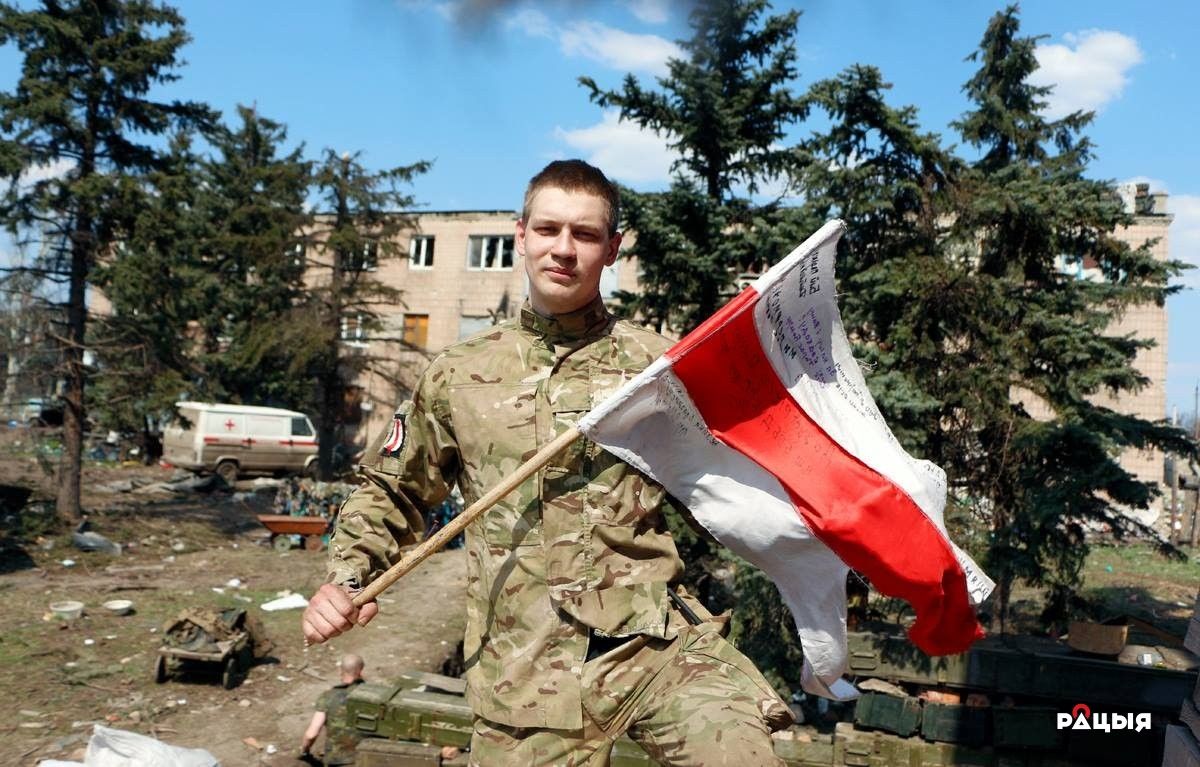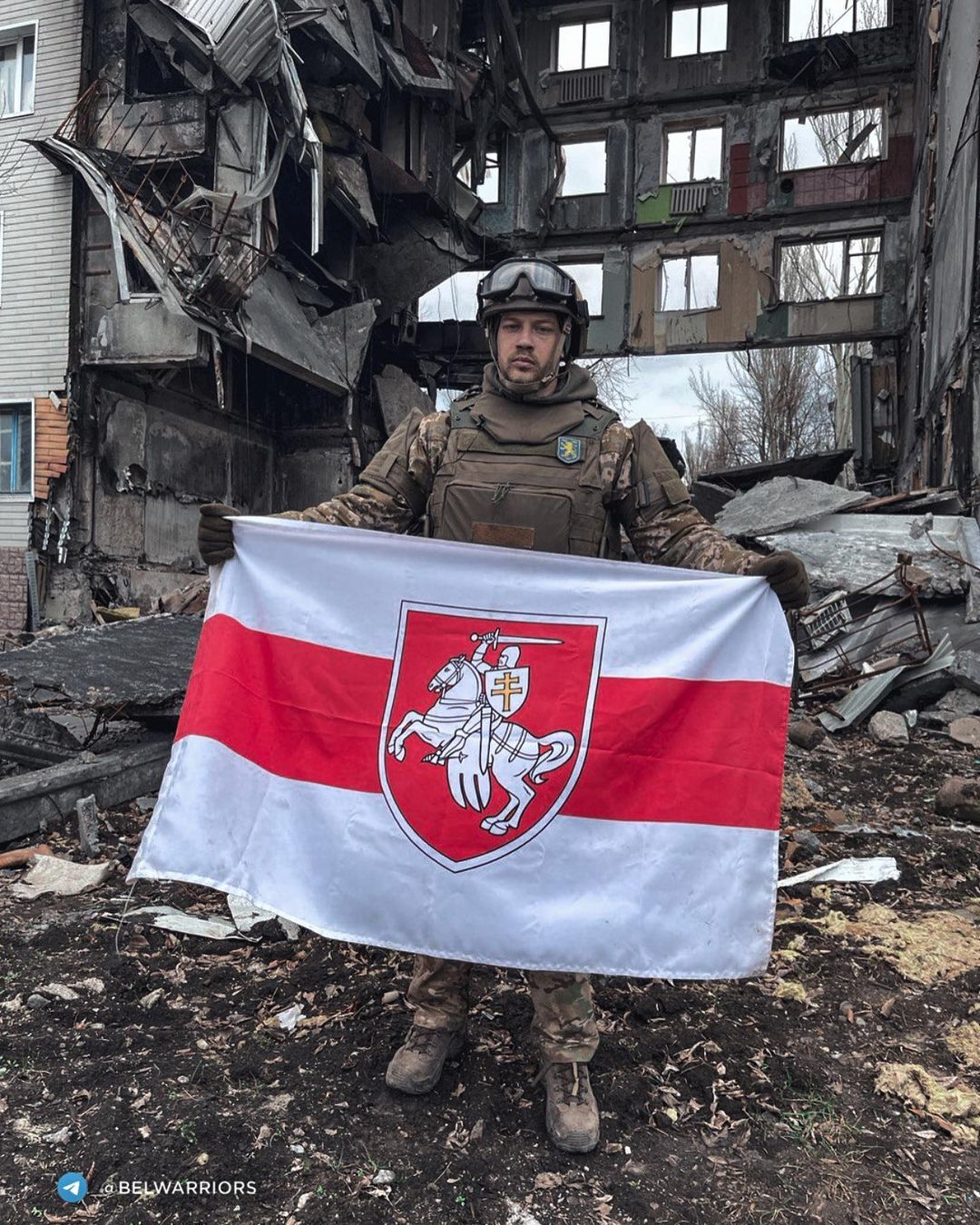Yan ‘Belarus’: Kalinouski's Regiment Is Lukashenka’s Nightmare
26- 26.01.2023, 11:51
- 29,722

PHOTO: 24TV.UA
Belarusian volunteers can bring off a battle to any unit of the security forces of the regime.
Belarusian volunteers from the Volat Battalion of the Kastus Kalinouski Regiment are taking part in the battles for Bakhmut. It is the main flash point in Ukraine today.
How do Belarusians cope with the tasks assigned to them? The Charter97.org website asked this and other questions to the commander of the Volat Battalion, Yan ‘Belarus’ Melnikau:
– If we talk about hostilities, then 70% of the Wagnerites-convicts recruited from prisons, as well as 30% of professional soldiers, are now fighting on the side of the Russian Federation near Bakhmut. Russians value technology because of the terrain. After all, because of the height difference, everything is visible for eight to ten kilometers. They really don't have many vehicles left.
The intensity of enemy artillery fell by half when we arrived in Bakhmut. Mostly mortar crews are operating, there are practically no cannon artillery and missile salvos. They began to use aviation due to the lack of artillery: they fly up at close range with the SU-25 attack aircraft. They are often downed, as it was a couple of days ago. A Russian aircraft was forced to take off from Soledar to hit targets near Bakhmut, so it was shot down.
The main tactics of the enemy are infantry groups of six-eight-twelve-fifteen soldiers. It looks like films about penal battalions during World War II, they are going to certain death, to slaughter. However, due to the number of forces that are used in this axis, their tactics have some success. The manpower of the Russians is several times greater than the number of the Ukrainian army.
– Are the Russians bombarding the city with the “meat”?
– Basically, they are sending several battle groups to identify observation points, as well as firing and strong points. This is done by withdrawing several strike groups. The strike groups are actually setting fire to themselves, which makes it possible to identify the main firing positions. Then the Russians are trying to inflict fire damage with mortars, flamethrowers, and grenade launchers, and then they are trying to put groups on the flanks to take up positions.
– How do Belarusians cope with the tasks assigned to them near Bakhmut?
Our tasks are very broad. We must not forget that in fact we are a full-fledged battalion, which is armed with anti-aircraft systems that allow us to shoot down air targets, we have anti-tank systems, as well as assault groups that can perform offensive actions, to take enemy positions.
We also have mortar units: we have at our disposal three 120-mm mortars. We have UAV units that help our infantry when they move out on missions, as well as correct the fire of our artillery giving a situational picture of one or another point on the front line.
We also have medical staff. They, praise God, do not work with our guys very often. We provide assistance to neighbouring units which are on the same border with us. We also have signal operators working with radio firmware and various software, as well as radio reconnaissance, making intercepts, the recordings of which you can hear on our channel. All this became possible thanks to our signal operators from the Volat Battalion.
“We knew in advance that the war would begin”
– Yan, you have been fighting in Ukraine since the very beginning of the war, since 2014. How did you, a twenty-year-old guy at that time, get to Ukraine?
– On January 23, it was nine years since I had come to Ukraine. I arrived the day after the death of Mikhail Zhyzneuski and Sergei Nigoyan [a Belarusian and an ethnic Armenian who became the first heroes of the Heavenly Hundred - ed.]. I realized that the pro-Kremlin government of Yanukovych began to kill Ukrainians, and among the dead was my compatriot.
Then I understood that I had no moral right to keep sitting straight when such things were happening to my brotherly people. My friends are living in Ukraine, I have been there many times personally. I realized that I had to be with these people to help and protect them from the dictator. After all, who, if not we, Belarusians, understands what it is like to live under the yoke of a pro-Russian senile who occupies a position that does not correspond to it? On January 23, I was already at the Maidan.
When Yanukovych fled, I thought it was time to return to Belarus. However, we were told that an occupation was already underway in Crimea and the Right Sector would create a unit to liberate it. I realized that I spent more than a month with the guys, fighting shoulder-to-shoulder on the barricades, so I decided to stay.
My first military trip took place on May 11, 214 - on the day of the so-called referendum in the "LPR". Together with the guys from the Right Sector, of which I was a member at the time, we went to Krasnoarmiisk, which is now called Pokrovsk. That's how I ended up in the war.

– What were you doing on February 24, 2022, when the full-scale invasion began?
– I was at the base of the Azov Regiment in Kyiv on this day. I woke up from missile attacks on the Antoniv plant. At that moment I was performing instructor functions at the recruiting center. For several months, the guys from the Azov and I have been training the territorial defence forces and the civilians in the basic principles of urban combat, providing medical care, handling weapons, and small group tactics.
We were raised in the morning, we waited until all the other guys had gathered, and went to get weapons, this was a pre-agreed plan in case the Russian troops went on a full-fledged offensive. We were ready for this. Of course, we did not know the exact date, but the backpacks were ready.
Around 12 o'clock we moved towards Dymer [a village in the Kyiv region of Ukraine - Ed.]. We had to identify the enemy columns. We saw the head of the Russian convoy, there were burnt cars. It was clear that the enemy retreated after the battle.
We took up positions along the road to Kyiv in order to halt the advance of the Russians if they again head the city. The next fighting was only a few days later. Roughly speaking, we were chasing the war, we were looking for it, but it was escaping us.
When there was a Russian landing in the city of Vasilkiv, we took part in the operation to eliminate those enemy forces that were landing in the area of the airfield and the flight school.
“I’ll show it to my wife because she says that all Belarusians are bad.”
– There were severe tensions between Ukrainians and Belarusians in the first days of the war. How ordinary Ukrainians treated you when they found out that you were Belarusians fighting for Ukraine.
– The Ukrainians with whom I fought have known me for many years. When our group arrived in Vasilkiv, we approached the building of the broken barracks of the flight school, took up positions, made barricades, waited for the forces to approach, talked and said that we were Belarusians. The main forces that participated in the first campaigns have been fighting in Ukraine since 2014, 2015, 2016. These were the guys who went through the Anti-Terrorist Operation [the War in Donbas - Ed.]. Everyone thanked us and rejoiced that we were the real Belarusians. "Thank you for being you," they said.
– How does the Ukrainian military assess the level of training of the Belarusians?
– When we carried out some operations on our own, stormed enemy positions, completed tasks in small groups, then we had one or two wounded, saving the lives of our fighters, the Ukrainians were surprised at our motivation and level of training.
They understand that we have a very high level of motivation for action, because we voluntarily came to the hottest spot and, in fact, choose the direction of work for ourselves.
Figuratively speaking, we communicate with the neighbouring unit holding the front, and understand at what point our actions to hold or push the enemy from already occupied positions will be the most successful.
So, the Belarusians enjoy only respect. Sometimes people took pictures with us. “I’ll show it to my wife because she says that all Belarusians are bad,” they were saying.
– How has the average portrait of a Belarusian volunteer changed since 2014?
– In 2014, these were adventurers with no military experience, young people. At least three out of five have no experience in military service. Basically, guys under thirty who are full of youthful romanticism and understanding that "you can change the world by going forward with a gun".
Today we have reached a high level of training, we have professional instructors, the equipment of each unit of the battalion is completely planned. No less attention is paid to the preparation of assault groups, the use of artillery, much attention is paid to medicine. Today, the organizational level is much higher than in our Belarus Tactical Group. Then it was a group of grenade launchers: there were machine gunners, there was a shooter with a sniper rifle without a full understanding of sniper shooting, and one or two hand grenade launchers. We could only support some attacks.
Today we can fully conduct actions to capture enemy positions, we have air cover, cover for snipers, forces to fight enemy armoured vehicles and artillery support for groups. This is something we can provide ourselves.
It seems to me that the Kalinouski Regiment is a nightmare for Lukashenka's regime today. In 2017, we could not have imagined that the Belarusians would be able to create forces in five years capable of fighting the units of the punitive institutions of the regime. Everything that Lukashenka has today: light armoured vehicles or special forces from Maryina Horka, special operations forces. We can give them an equal fight.
– Today you lead a battalion named after Pavel 'Volat', who died for the freedom of Ukraine. What kind of person was he?
– He was an absolutely fearless warrior, a man of action. In two words: "More to be than to look." There is an important thing, Pasha was wounded three times, once very seriously, before the beginning of the full-scale operations. He had several fragments in his head and one in his heart.
Back in December 2021, we met with him and the guys to discuss the joint organization of the Belarusian in case of a war.
He was one of those commanders who believed that no one can do better if you don't do it yourself. Pavel understood the responsibility to his subordinates, who did not take part in the hostilities until 2022. He walked ahead of the guys and led them. Pavel was one of those commanders who said: "Go ahead, attack, follow me."
On the day that Pavel died, he led the group behind him. They ran into an unidentified explosive object, likely an anti-personnel landmine. We suspect remote mining. Pavel was ahead. It turned out that the rest of the soldiers in the operation received minimal damage, a few fragments, because he managed to react to the fact that the explosive device went off and gave the command to “lie down”. In fact, the main fragments hit him.
“Young officers from Maryina Horka ask rhetorically: 'What have we forgotten in Ukraine?'”
– What do you think, can they send Belarusian troops to the war in Ukraine?
– If we round it up, it's 20,000 with all the support platoons. Incompetent, untrained people who have no idea what fighting is. These are the military, who have no motivation to wage a war.
You can put Belarus and Russia on equal footing as much as you like, we understand that in fact, our country is a satellite of the Kremlin today, but propaganda that tries to set society on enmity with Ukrainians, on the enmity between our nations, countries, is not the same as in Russia. The propaganda machine really works in the Russian Federation, the Russians believe that "Ukrainians are enemies" who "want to destroy them". They have some kind of explanation for their actions, our military does not have such a position.
We have in the unit former Belarusian officers of the most combat-ready units who still have contacts with people from the 36th Brigade, the Special Forces from Maryina Horka and the Vitebsk paratroopers. They say that most of the young officers and conscripts look at possible participation with the rhetorical question: “What have we forgotten in Ukraine?”
Indeed, Belarus has nothing to do in Ukraine. I think that Lukashenka and Putin are well aware that the level of motivation of the Belarusian units is zero. Yes, there are old crumb officers who graduated from educational institutions back in the USSR, and who have friends in the Russian army. Perhaps they are nostalgic for the Soviet times. But you need to understand that the Soviet Union collapsed more than thirty years ago, today's school of young officers does not remember it, does not love it and feels no nostalgia for it.
– What would you say to the Belarusians who can be sent to this criminal war?
I would say that they have nothing to do here. Dying for the interests of the Kremlin is not the goal in life for which their parents gave them lives. They need to ask ourselves the right questions: is there a threat to Belarus? Do you believe that there are "strikes from the four directions and a pre-emptive strike", in the propaganda? You need to understand all the absurdity of the nonsense that Lukashenka says. You need to understand that everything that is happening is the build-up of the imperial appetite of the Russian Federation, which began in Transnistria, and then came to Ukraine through the wars in Chechnya and Georgia. You need to understand that dying for the imperial ambitions of the tsar is not the best destiny in life.
I am addressing the Belarusians as the commander of the Volat Battalion. If they send you here, you must not forget that we are from the same nation. As soon as there are facts that the Belarusians are in Ukraine and are participating in the battles on the side of Russia, we will be immediately sent to this area. I urge the Belarusians to surrender to us as prisoners. We have no hatred for the Belarusians, who will be sent to die on Putin's orders. Of course, if we meet on the battlefield and you will point weapons at us - we will not talk, we will shoot.
However, we want these people to lay down their arms, study the possibilities of surrendering as prisoners and not take the sin of fratricide on their conscience. We will do our best to help Belarusians get out of the hostilities and return home at the end of the war as heroes who refused to participate in the criminal war, and not as villains and murderers with prison terms.
“Lukashenka will not be able to stay in power even half a year after the victory of Ukraine”
– How realistic is the liberation of Belarus today by the forces of the Kalinouski Regiment?
– It is too early to talk about this. Of course, one of our units is not enough to carry out actions to liberate the entire Belarus. The first step towards liberation is helping Ukraine win this war, weakening Russia as an aggressor state. When Ukraine is able to reach the administrative borders of 1991, and Russia will no longer be able to make new attacks and enter Ukrainian soil again, will be incapable of carrying out offensive actions, this will be the first step to the fact that Russia will no longer help Lukashenka. All the forces of Moscow will be busy resolving interethnic and national conflicts.
Civil strife will start in Russia as soon as it weakens militarily and geopolitically. The Caucasus will break out, the redistribution of zones of influence will begin, the Kremlin will care not about Belarus, nor Lukashenka. Then, I think, the people of Belarus will have the opportunity to revolt against the dictator, and Europe will be obliged to support the implementation of this right. My prediction is that Lukashenka will not be able to stay in power even half a year after the victory of Ukraine.

– What would you like to do in free Belarus?
– I always said back in 2014-2015, that I wanted to be a history teacher and work with young people. Belarus has a huge problem with national identity. I realized the importance of national identity in Ukraine. All success begins with the fact that you, as the people of the country, feel as a whole. We have problems with this. Belarus needs a national revival, which failed in the 90s, so in the twenties and thirties we must focus on the national revival.
I believe that this is the stage from which our economic well-being will begin, an independent army that will serve in the interest of protecting our sovereign borders. An understanding must come that our country is a geopolitical subject and not an object of the actions of our neighbours.











